- Blog
- > Post-College
The New Rules of College Graduate Hiring: What C-Suite Executives Really Want in 2025
- Dr. Rachel Rubin
- | April 14, 2025

The college-to-career pathway has historically represented a predictable progression: earn a degree, secure an entry-level position, and begin climbing the corporate ladder. But in 2025, that pathway is undergoing its most profound transformation since the digital revolution of the 1990s.
Our April 2025 survey of 84 C-suite executives at major corporations reveals that artificial intelligence is eliminating entry-level positions at 52% of companies while fundamental hiring criteria are shifting in ways few educators or students have fully recognized.
The findings suggest we have entered a new era in college graduate employment—one that demands a recalibration of how universities prepare students and how college graduates position themselves for success.
The AI Paradox: Higher Standards for Fewer Positions
The most alarming finding is that more than half of executives (50%) report AI adoption has reduced entry-level positions at their organizations. Only 8% saw increases in early-career roles due to AI, while 42% report no substantial change.
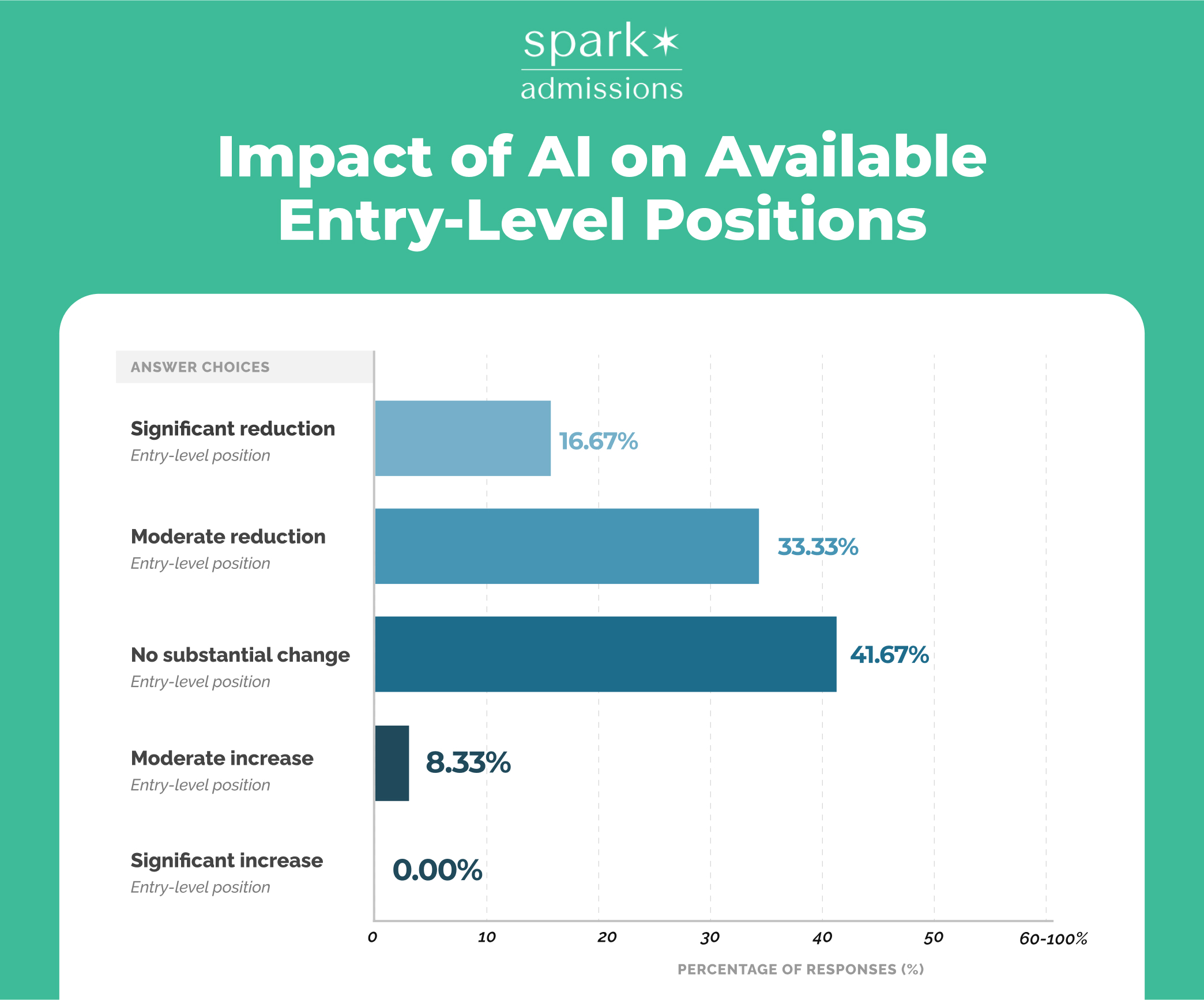
This creates what I call the ‘entry-level experience paradox. With fewer entry-level positions available, the standards for securing these roles have risen dramatically. New college graduates need more experience than ever to land positions traditionally designed for those without experience.
Among executives who reported AI-driven reductions in entry-level positions, an overwhelming 86% consider internships or relevant work experience either “very important” or “essential” when hiring recent college graduates. The days when a strong academic record alone could secure entry-level employment appear to be over.
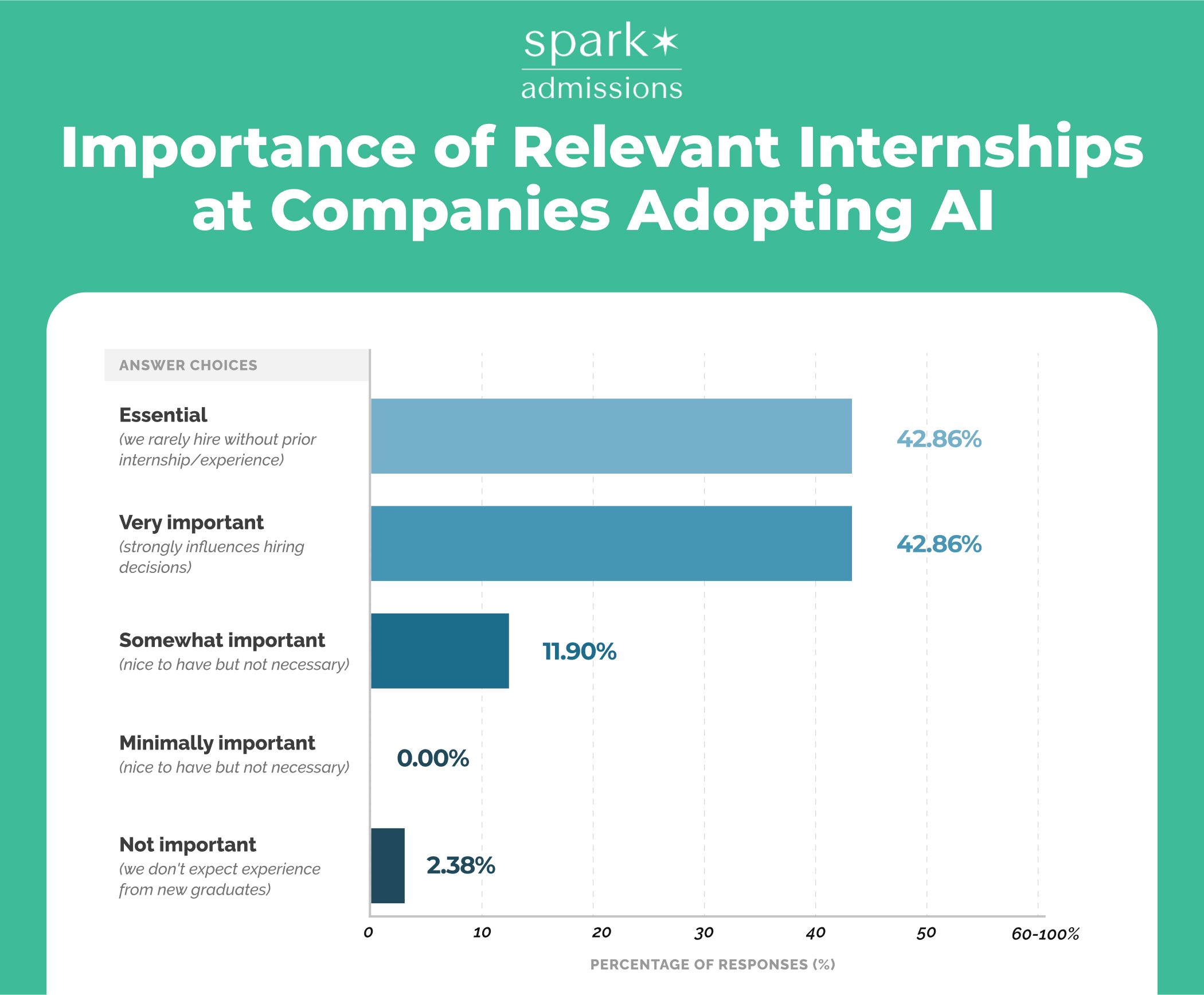
The Dual Reality of Increased Hiring Amid Position Reduction
One of the most intriguing aspects of the survey data is an apparent contradiction: while 55% of executives reported stable or increased hiring of recent college graduates compared to the previous year, 52% also indicated AI has reduced entry-level positions (please note, some entry-level positions may not require a college degree). This seeming inconsistency actually reveals a fundamental transformation in the college graduate hiring landscape.
What we’re witnessing isn’t simply the elimination of entry-level roles but rather their evolution. Companies are still bringing in new talent, but they’re reconfiguring how these positions function within their organizations.
The survey data suggests several explanations for this phenomenon. Many companies are replacing traditionally defined entry-level positions with redesigned roles that require more specialized skills or experience. Others are consolidating functions that once employed multiple junior staff into more comprehensive positions that demand higher capabilities from fewer individuals.
Organizations are reducing positions in areas most vulnerable to automation while simultaneously creating new college graduate opportunities in domains that complement AI capabilities or require distinctly human skills.
This transformation explains the seemingly contradictory salary data as well. Among companies reporting significant AI-driven reductions in entry-level positions, 26% still offer starting salaries of $95,000-$110,000 for bachelor’s graduates, while 19% provide $105,000-$120,000 for those with advanced degrees—figures that reflect intense competition for a smaller pool of high-impact entry-level positions.
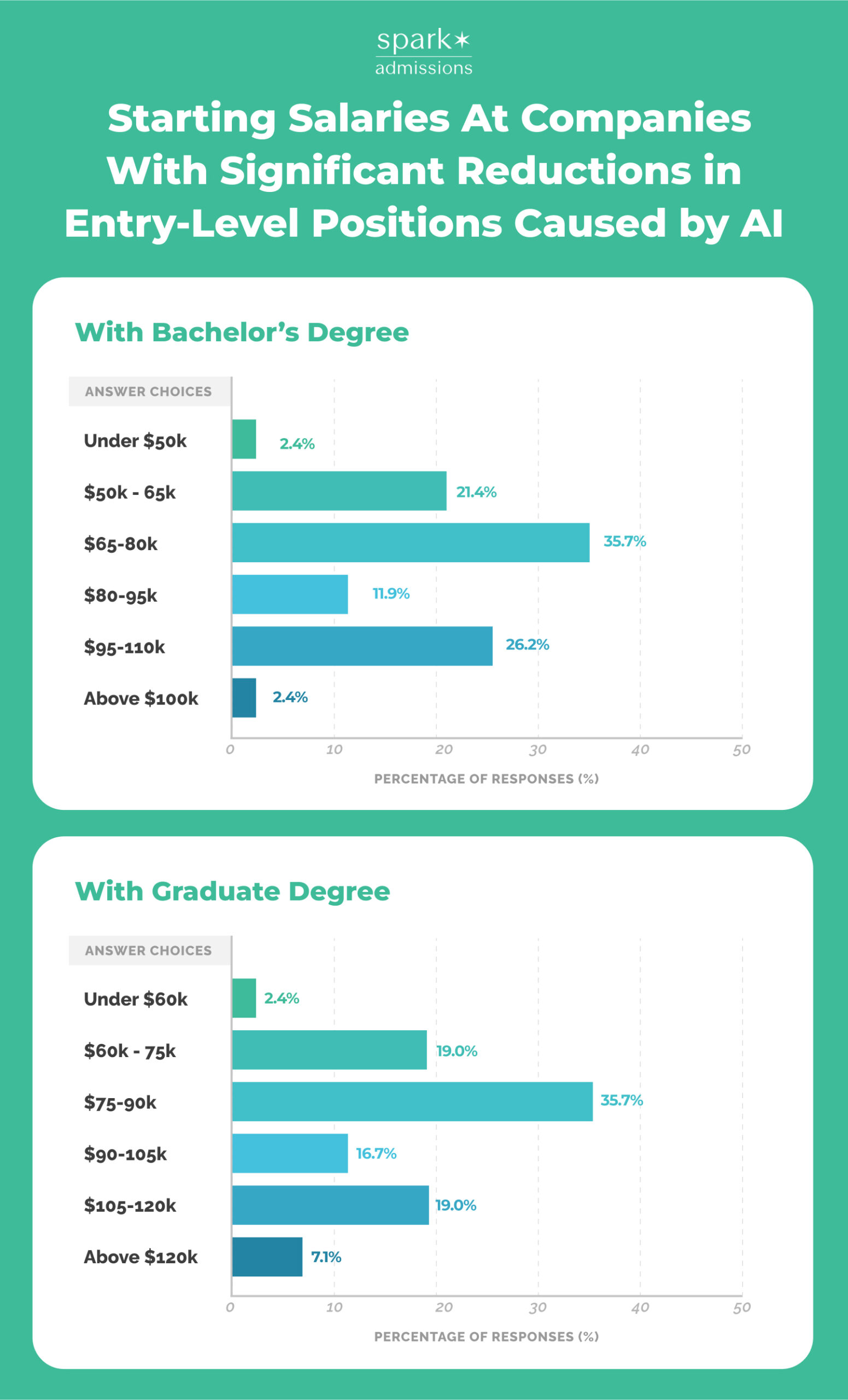
The key insight for college graduates isn’t that opportunities are disappearing. It’s that the traditional conception of the entry-level job as a training ground is being replaced by positions that demand higher-order skills from day one.
The Modest Return on Graduate Education
For students weighing the substantial cost of graduate school, the survey offers sobering insights about the financial returns on advanced degrees. The median starting salary for bachelor’s degree holders ranges from $65,000 to $80,000, while those with graduate degrees typically earn between $90,000 and $105,000.
This $25,000 to $30,000 premium represents a 30-40% increase, which is significant but may not justify the additional years of education for many students. Particularly in STEM fields, where bachelor’s graduates can often start at $95,000 or more, the advanced degree premium becomes less compelling when considering opportunity costs.
The data reveals field-specific variations in this premium. Engineering and computer science show smaller differentials between degree levels, while humanities and social sciences demonstrate proportionally larger premiums for advanced education.
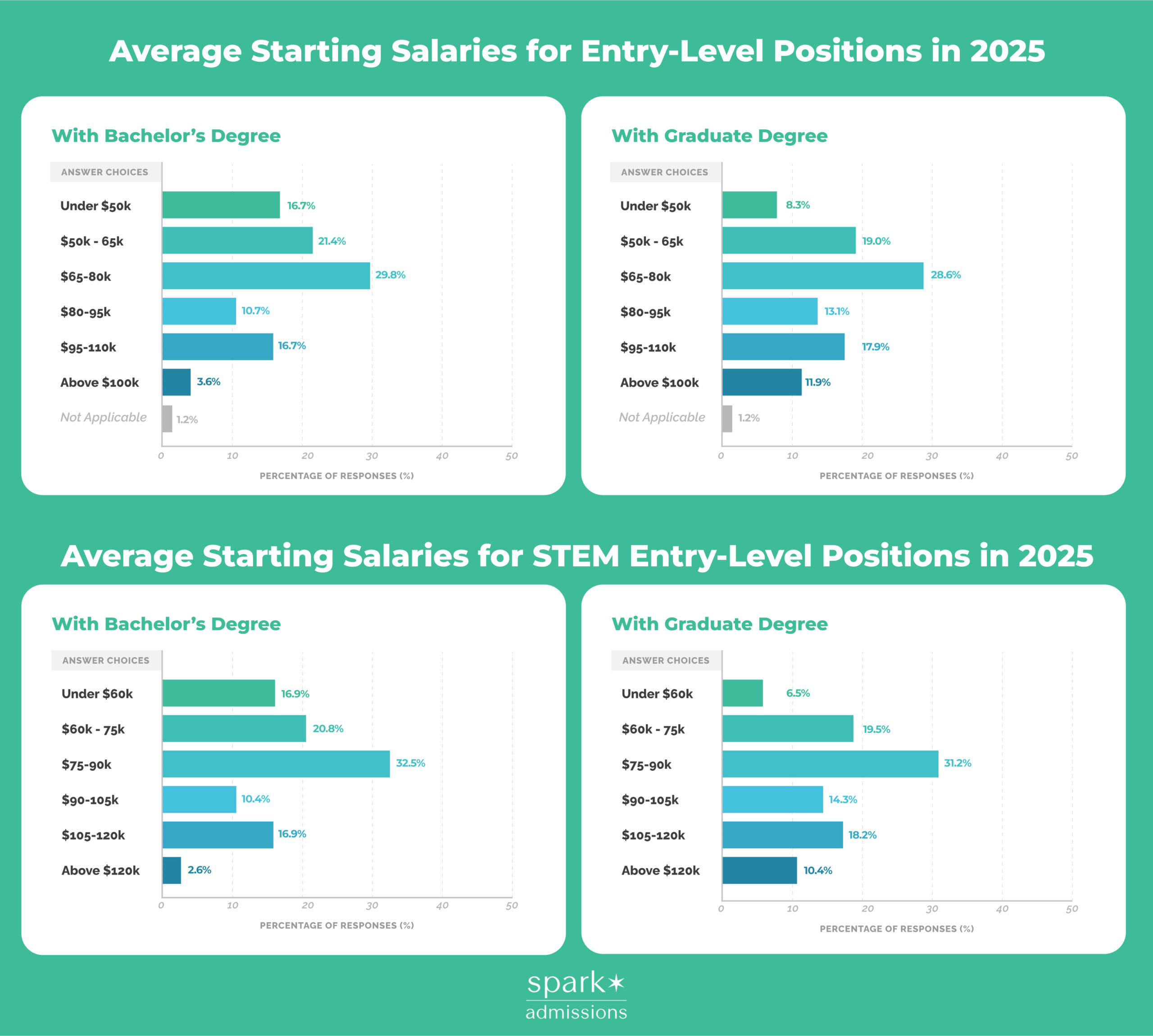
The Surprising Persistence of GPA
Despite widespread advice that “grades don’t matter after college,” the survey reveals that academic performance remains critically important to hiring executives, with nearly 83% considering GPA at least somewhat important in their decisions.
We’ve seen a marked disconnect between the narrative that ‘GPA doesn’t matter’ and what employers actually value. The data shows 12% of executives consider GPA ‘essential’ with strict cutoffs, while another 43% rate it ‘very important’ in hiring decisions. Only about one in five employers truly disregard academic performance.
This finding implies that many executives may use GPA as a proxy for work ethic and consistency. It’s an imperfect measure but still one of the best predictors they have for early-career success.
University Prestige Still Matters
The survey confirms what many suspect but few openly discuss: university prestige continues to significantly influence hiring decisions, with over half (51%) of executives considering it an “important” or “critical” factor.
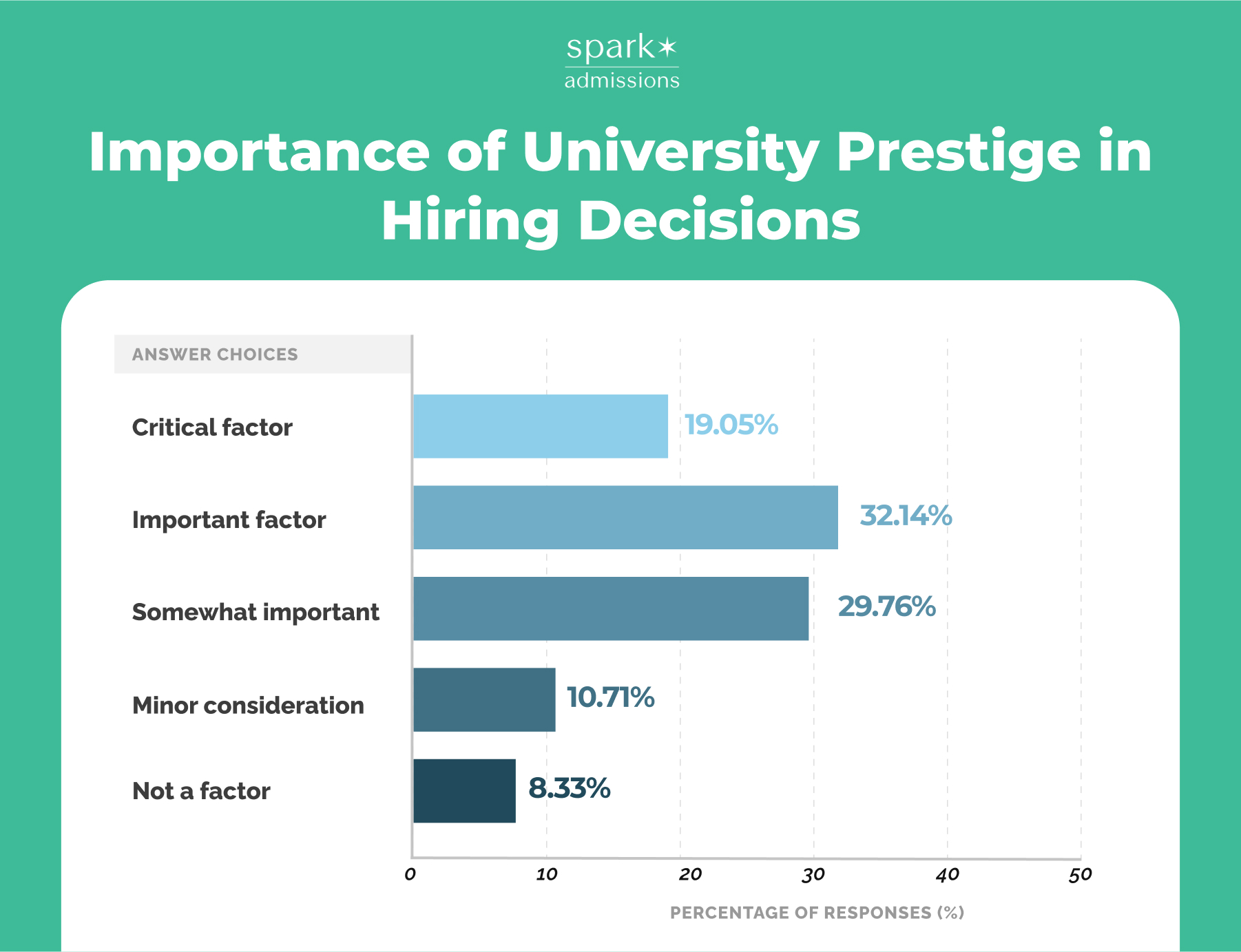
The advantage of elite institutions is further reinforced by recruitment practices. We found that 42% of companies maintain preferred university lists, with 38% recruiting primarily from prestigious universities and 26% targeting universities with specific strengths in their field. Only a third focus on qualifications regardless of university.
This creates a self-reinforcing cycle that advantages college graduates from well-known institutions. Companies concentrate recruiting efforts at select schools, increasing opportunities for those students while potentially overlooking qualified candidates from less prestigious universities.
The Skills Gap: Communication Trumps Technical Ability
While technical competence remains important, when asked the top 3 skills most lacking in recent college graduates, the survey revealed a surprising consensus about where recent college graduates most frequently fall short.
Communication abilities topped the list, with 51% of executives citing verbal communication and presentation skills as the most lacking attribute.
This represents a significant opportunity for students who develop these softer skills. Problem-solving and critical thinking followed at 50%, with leadership and initiative at 44%, and written communication at 42%. Technical skills were less frequently mentioned as lacking, suggesting universities are adequately preparing students in domain-specific knowledge.
This finding challenges the heavy emphasis on technical training that has dominated educational discourse. You can teach technical skills more easily than you can develop communication abilities. The data suggests that liberal arts graduates with strong communication skills may have advantages that aren’t being fully recognized in our STEM-focused educational narrative.
Post-Pandemic College Graduates Are Better Than Expected
Contrary to concerns about pandemic learning disruptions, executives view recent college graduates more favorably than pre-pandemic cohorts. A combined 57% find current college graduates either “somewhat more prepared” or “much more prepared” than their pre-pandemic peers, while only 20% consider them less prepared.
This positive assessment challenges the dominant narrative about pandemic-related educational deficits. The data suggests many students may have developed valuable adaptability through their disrupted educational experiences. The resilience required to navigate education during a global crisis appears to translate well to workplace challenges.

What This Means for Upcoming College Graduates
The implications of these findings extend to all participants in the higher education ecosystem. For students, it is important to develop communication skills and leadership alongside technical abilities, secure meaningful internships early, maintain strong academic performance, and carefully consider whether graduate school offers sufficient ROI in their chosen field.
Universities face mounting pressure to address the persistent soft skills gap while maintaining strong technical education and industry partnerships. The continued importance of university prestige suggests the value of institutional brand-building remains high despite criticism of rankings-focused approaches.
Employers must balance AI implementation with strategic talent development and consider recruitment timing adjustments to secure top talent. Most begin recruitment 6-9 months before graduation (37%), but competition for the best candidates may push this timeline earlier.
As these findings illustrate, college graduate hiring remains resilient despite automation and economic pressures, but the nature of entry-level work is evolving significantly. Those who understand these changing dynamics—and adapt accordingly—will have the advantage in the years ahead.